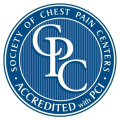
Chest pain and heart attack
Chest pain is one of the most common reasons that people seek emergency care. It can result from blocked or reduced blood flow to the heart - a heart attack. It can also be a warning sign that a heart attack may occur.
It is critical to quickly determine if patients with chest pain are suffering from a heart attack or other heart problem, are at risk of having a heart attack, or are experiencing chest pain unrelated to their heart health. It is also important to determine what kind of heart attack a patient may be experiencing. Doctors may use the terms acute myocardial infarction (AMI), STEMI and non-STEMI to describe different types of heart attacks. (STEMI means ST-elevation myocardial infarction).
Allina Health Minneapolis Heart Institute® physicians are at Abbott Northwestern Hospital 24/7 to care for patients who arrive with a heart attack. As well, they are available to work with physicians in community-based hospitals to determine whether patients need to be transferred to Abbott Northwestern or if they can be treated locally, depending on the type and severity of the chest pain.
The Chest Pain Program helps doctors determine when patients need immediate evaluation and treatment for chest pain. It also provides guidance in caring for patients who don't need immediate care, but who may need to be seen by a cardiologist or other medical specialist for follow-up care.
Society of Chest Pain Center accreditation
 Abbott Northwestern was the first hospital in Minnesota to be accredited by the Society of Chest Pain Centers.
Abbott Northwestern was the first hospital in Minnesota to be accredited by the Society of Chest Pain Centers.
Allina Health Minneapolis Heart Institute® has developed guidelines and systems to care for all cardiovascular emergencies. These streamlined processes have been applied to caring for patients with chest pain. This is helping hospitals throughout the region provide better care for patients with all types of chest pain. In the case of AMI, mortality was decreased by 50 percent.
Sudden cardiac arrest
Sudden cardiac arrest (SCA) is usually caused by an electrical malfunction of the heart called ventricular fibrillation.
Ventricular fibrillation causes a quivering of the heart muscle that makes it unable to pump blood through the body. Once the blood stops circulating, a person quickly loses consciousness and the ability to breathe, and will die without effective treatment.
In addition to the risk of death, sudden cardiac arrest can cause permanent brain damage.
Allina Health Minneapolis Heart Institute®'s innovative "Cool It" Program saves lives and decreases the risk of brain damage by quickly cooling the patient's core body temperature in order to slow down blood flow. This process is called therapeutic hypothermia.
Many different health care providers and medical specialists must work closely together to treat patients with hypothermia. Cooling often begins before the patient is transferred to Abbott Northwestern. Special equipment, medications and processes are used to cool the patient to the ideal temperature quickly. Then the patient is carefully managed by cardiologists, intensive care doctors, rehabilitation specialists and others throughout treatment and recovery.
Sudden cardiac arrest can happen to anyone at any time. That's why it is important to know where AEDs are located anywhere you work, live or play. Find out more at the Allina Health Heart Safe Communities.